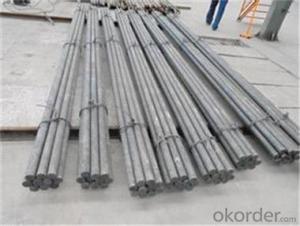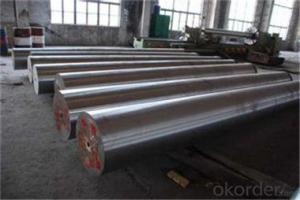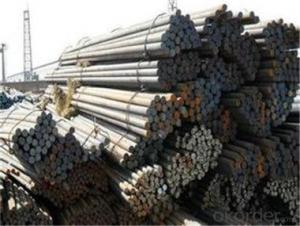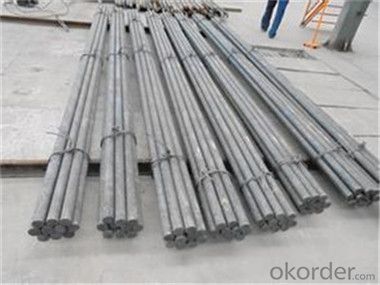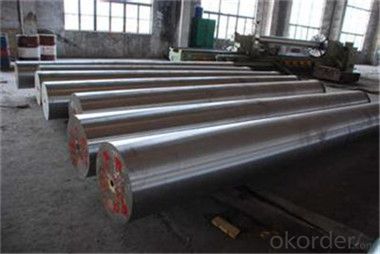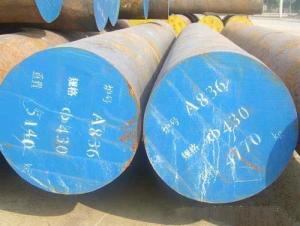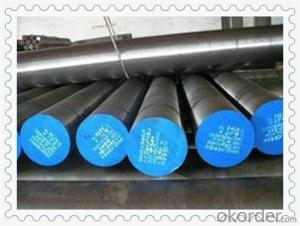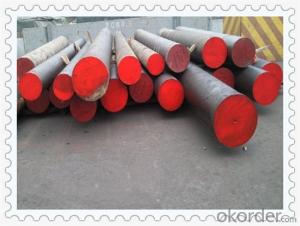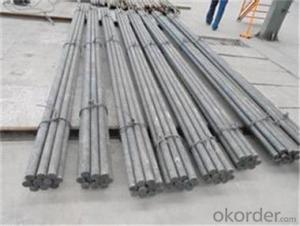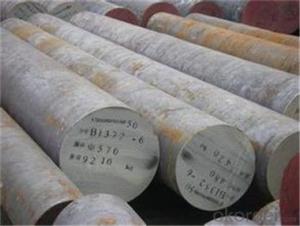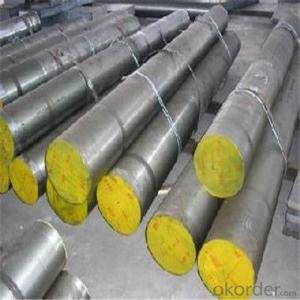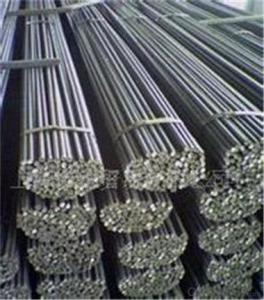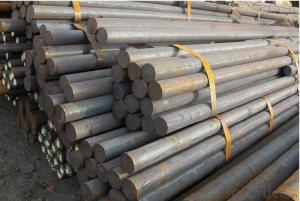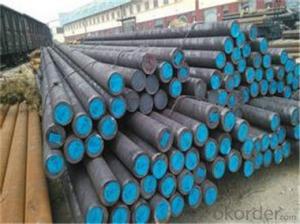HSS Steel Round Bar Alloy Round Tool Steel BarD2/H13
- Loading Port:
- Tianjin
- Payment Terms:
- TT OR LC
- Min Order Qty:
- 555 m.t.
- Supply Capability:
- 2000000 m.t./month
OKorder Service Pledge
OKorder Financial Service
You Might Also Like
Description of steel round bar:
Characteristic:Tungsten-molybdenum high speed steel developed by China,high performance in toughness ,hardness, high temperature hardness.
Festures of steel round bar:
Anneal temperature: 840-860
Relief annealing temperature: 720-760
Hardening temperature: 1210-1230
Hardening medium: salt bath under 600,aslo use oil cooling or air cooling
Normal temper temperation: 540-560 RC Rockwell Hardness after hardening and temperature: 63-66
Production Capacity: 1000 Tons/Month
Tech:EAF+LF+VD+ESR
High strength at elevated temperatures
Specifications of steel round bar:
| C | Si | Mn | W | Mo | Cr | V | P | S |
| 0.80-0.90 | 0.20-0.45 | 0.15-0.40 | 5.50-6.75 | 4.50-5.50 | 3.80-4.40 | 1.75-2.20 | ≤0.030 | ≤0.030 |
Images of steel round bar:
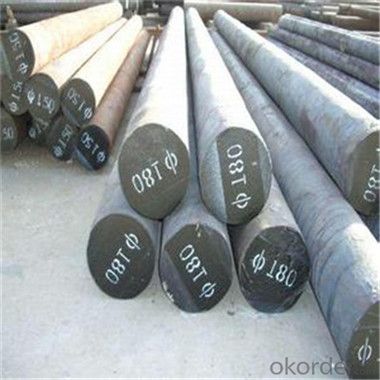
FAQ:
1. What is your package?
Packing situation: standard seaworthy packing or as customer required.
2. How long is the lead time?
Delivery time: 45 days after order confirmed.
3. What payment term do you accept?
Payment: T/T or L/C at sight.
- Q: How are steel round bars classified based on their shape?
- Steel round bars are classified based on their shape as either hot-rolled or cold-drawn round bars.
- Q: Can steel round bars be used in the manufacturing of appliances?
- Yes, steel round bars can be used in the manufacturing of appliances. Steel is a durable and versatile material that can be shaped into different forms, including round bars, which can be used for various purposes in appliance manufacturing such as structural support, handles, or components.
- Q: What are the advantages of using nickel-tin alloy steel round bars?
- Nickel-tin alloy steel round bars offer numerous benefits. Firstly, their corrosion resistance is excellent, making them perfect for use in harsh environments and with corrosive substances. The addition of nickel and tin enhances their durability and longevity, enabling them to withstand prolonged exposure to moisture, chemicals, and other corrosive elements. Secondly, these round bars provide superior strength and toughness. The combination of nickel and tin in their alloy composition improves their mechanical properties, making them highly resistant to deformation, bending, and breaking. As a result, they are suitable for demanding applications in industries such as construction, aerospace, and automotive. Additionally, nickel-tin alloy steel round bars exhibit exceptional heat resistance. They can endure high temperatures without significant loss of strength or deformation. This makes them ideal for applications involving exposure to elevated temperatures, such as in furnaces, boilers, and heat exchangers. Moreover, nickel-tin alloy steel is renowned for its excellent electrical conductivity. This property makes the round bars suitable for applications requiring efficient electrical transmission, such as in electrical wiring, power generation, and electrical equipment manufacturing. Lastly, machining and fabricating nickel-tin alloy steel round bars is relatively easy. They can be shaped, cut, and welded with ease, allowing for versatility in various manufacturing processes. This ease of machining and fabrication ensures efficient production and reduces overall manufacturing costs. In conclusion, the advantages of using nickel-tin alloy steel round bars include outstanding corrosion resistance, superior strength and toughness, high heat resistance, excellent electrical conductivity, and ease of machining and fabrication. These properties make nickel-tin alloy steel round bars the preferred choice for a wide range of applications in diverse industries.
- Q: What is the red hardness of a steel round bar?
- The red hardness of a steel round bar refers to its ability to maintain its hardness and resistance to deformation at high temperatures. It is a measure of how well the steel can retain its strength and hardness when exposed to heat. Generally, steels with higher carbon content exhibit higher red hardness. This property is particularly important in applications where the steel is subjected to elevated temperatures, such as in forging or heat-treating processes. The red hardness of a steel round bar can be determined through various tests and measurements, such as hardness testing at different temperatures or by evaluating the steel's microstructure.
- Q: What are the different grades of steel round bars available?
- There are various grades of steel round bars available, each with different properties and applications. Some common grades include: 1. Mild Steel: This grade is the most commonly used and affordable option. It has a low carbon content and is easy to weld, cut, and form. Mild steel round bars are suitable for general construction projects, fabrication, and manufacturing. 2. Carbon Steel: With a higher carbon content than mild steel, carbon steel round bars offer greater strength and hardness. They are often used in applications that require high strength, such as machinery parts, shafts, and axles. 3. Alloy Steel: Alloy steel round bars are made by adding various alloying elements such as chromium, nickel, manganese, or molybdenum to improve specific properties. These bars offer enhanced strength, toughness, and wear resistance, making them suitable for applications like automotive parts, gears, and tools. 4. Stainless Steel: Stainless steel round bars are corrosion-resistant and have excellent mechanical properties. They are widely used in industries such as construction, food processing, and medical equipment manufacturing. Different grades of stainless steel, such as 304, 316, or 410, offer varying levels of corrosion resistance and strength. 5. Tool Steel: Tool steel round bars are specifically designed for making tools and dies. They have high hardness, wear resistance, and heat resistance properties. Tool steel grades like D2, A2, or O1 are commonly used for making cutting tools, molds, and dies. It's essential to select the appropriate grade of steel round bars based on the specific requirements of your project, considering factors such as strength, corrosion resistance, hardness, and machinability. Consulting with a steel supplier or an engineer can help identify the most suitable grade for your application.
- Q: Can steel round bars be machined easily?
- Yes, steel round bars can be machined easily due to their excellent machinability properties.
- Q: How are steel round bars tested for quality and strength?
- To ensure that steel round bars meet the necessary standards and specifications, various methods are employed to test their quality and strength. One commonly used test is the tensile test, which measures the bar's ability to withstand tension. In this test, a sample of the steel bar is gradually loaded until it reaches its breaking point, and the maximum load it can handle is recorded, along with the sample's elongation and reduction in area. These values offer valuable insights into the bar's strength and ductility. Another test employed is the hardness test, which assesses the steel bar's resistance to indentation or penetration. This test utilizes a hardness testing machine that applies a specific force to a small indenter, such as a diamond or a steel ball, and measures the resulting indentation's depth or size. The obtained hardness values can indicate the bar's strength and its ability to withstand wear and deformation. Apart from these mechanical tests, non-destructive testing methods are also used for steel round bars. Ultrasonic testing is a common technique employed to identify internal defects or inconsistencies in the bar's structure. This method involves transmitting high-frequency sound waves through the bar and analyzing the reflected waves to detect any irregularities. Magnetic particle inspection is another non-destructive test that relies on magnetic fields and particles to identify surface or near-surface defects in the steel bar. Chemical analysis plays a crucial role in determining the quality of steel round bars. This analysis involves testing the steel's composition to ensure it meets the required chemical specifications. It helps identify the presence of impurities or elements that could impact the bar's performance and durability. In summary, steel round bars undergo a combination of mechanical, non-destructive, and chemical tests to evaluate their quality and strength. These tests provide manufacturers with essential information, enabling them to ensure that the bars meet the necessary standards and are suitable for their intended applications.
- Q: What are the different bending methods for steel round bars?
- There are several bending methods for steel round bars, including hot bending, cold bending, and induction bending. Hot bending involves heating the steel bar to a high temperature and then bending it into the desired shape. Cold bending, on the other hand, is done at room temperature and involves applying force to the bar to achieve the desired bend. Induction bending uses heat generated by electromagnetic induction to soften the steel and then applies force to bend it.
- Q: How are steel round bars used in the construction of high-rise buildings?
- Steel round bars are commonly used in the construction of high-rise buildings as they provide structural support and reinforcement. These bars are used in various applications such as columns, beams, and foundations to enhance the overall strength and stability of the structure. Additionally, steel round bars provide flexibility in design, allowing for efficient load distribution and resistance against external forces such as earthquakes and high winds.
- Q: What are the different surface treatments for steel round bars?
- There are several different surface treatments available for steel round bars, each serving a specific purpose and providing unique benefits. Some of the most common surface treatments for steel round bars include: 1. Hot-dip galvanizing: This process involves immersing the steel round bars in a bath of molten zinc, which creates a protective coating that helps prevent corrosion and rusting. Hot-dip galvanizing is an effective treatment for steel round bars used in outdoor or corrosive environments. 2. Painting: Applying a coat of paint to the surface of steel round bars not only enhances their appearance but also provides a protective barrier against moisture and oxidation. Painting is commonly used for decorative purposes or when a specific color is desired. 3. Powder coating: Powder coating involves applying a dry powder to the steel round bars, which is then cured under heat to form a durable and attractive finish. This treatment offers excellent resistance to impact, chemicals, and UV rays, making it suitable for various applications. 4. Electropolishing: This process uses an electric current and an electrolyte solution to remove a thin layer of the steel round bars' surface, resulting in a smooth and shiny finish. Electropolishing improves the appearance and corrosion resistance of the steel, making it ideal for applications that require a high level of cleanliness and aesthetics. 5. Passivation: Passivation involves treating the steel round bars with an acid solution to remove any free iron or iron oxide from the surface, thus enhancing their corrosion resistance. Passivation is commonly used for stainless steel round bars to increase their longevity and prevent staining or rusting. 6. Shot blasting: Shot blasting is a mechanical surface treatment that involves bombarding the steel round bars with small steel balls or particles at high velocity. This process removes any surface contaminants, scale, or rust, resulting in a clean and roughened surface that improves adhesion for subsequent coatings or treatments. 7. Chrome plating: Chrome plating is a technique where a thin layer of chromium is electroplated onto the surface of steel round bars. This treatment provides excellent corrosion resistance, wear resistance, and a shiny appearance, making it suitable for applications that require durability and aesthetics. Overall, the choice of surface treatment for steel round bars depends on the specific requirements of the application, such as corrosion resistance, aesthetics, or wear resistance. It is important to carefully consider the intended use and environmental conditions before selecting the most appropriate surface treatment for steel round bars.
Send your message to us
HSS Steel Round Bar Alloy Round Tool Steel BarD2/H13
- Loading Port:
- Tianjin
- Payment Terms:
- TT OR LC
- Min Order Qty:
- 555 m.t.
- Supply Capability:
- 2000000 m.t./month
OKorder Service Pledge
OKorder Financial Service
Similar products
Hot products
Hot Searches
Related keywords
